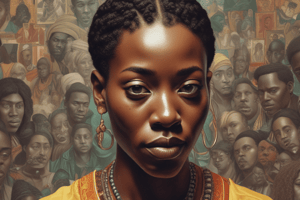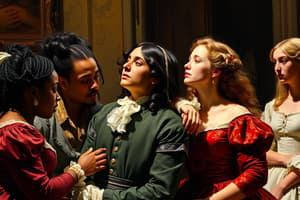Podcast
Questions and Answers
What is the main argument of playwright August Wilson regarding colour-blind casting?
What is the main argument of playwright August Wilson regarding colour-blind casting?
- It simplifies the historical narrative.
- It allows for a reinterpretation of stories.
- It creates more roles for BIPOC actors.
- It denies actors their cultural identity. (correct)
What does colour-conscious casting involve?
What does colour-conscious casting involve?
- Considering the cultural background of characters. (correct)
- Increasing opportunities for all actors regardless of race.
- Emphasizing diversity in the background setting.
- Avoiding any reference to race in casting decisions.
What critique is associated with the Hamilton production regarding its casting strategies?
What critique is associated with the Hamilton production regarding its casting strategies?
- It does not provide opportunities for aspiring actors.
- It overlooks the experiences of BIPOC actors. (correct)
- It solely uses white actors for major roles.
- It completely ignores historical accuracy.
Which example is cited as a problematic instance of colour-blind casting?
Which example is cited as a problematic instance of colour-blind casting?
How do some historians view the historical inaccuracies in Hamilton?
How do some historians view the historical inaccuracies in Hamilton?
What aspect of the film Gandhi has been criticized concerning its portrayal of the title character?
What aspect of the film Gandhi has been criticized concerning its portrayal of the title character?
Why is colour-blind casting often seen as problematic?
Why is colour-blind casting often seen as problematic?
What does effective colour-conscious casting require?
What does effective colour-conscious casting require?
What was one of the results of the shift in historical methodology over time?
What was one of the results of the shift in historical methodology over time?
What is one implication of replacing historical figures with actors of different races in productions?
What is one implication of replacing historical figures with actors of different races in productions?
Flashcards are hidden until you start studying
Study Notes
Colour-Blind Casting vs Colour-Conscious Casting
- Colour-blind casting disregards race/ethnicity in the casting process.
- Playwright August Wilson argues that it erases actors' cultural identities and history, akin to cultural assimilation.
- Critics claim it can reinforce existing racial stereotypes.
- Gained prominence in the 1980s to enhance opportunities for BIPOC performers.
- Colour-conscious casting acknowledges race and ethnicity, emphasizing cultural context and responsibility from writers and directors.
- Allows for reinterpretation of history and characters in storytelling.
- “Hamilton” illustrates both approaches: colour-blind casting with black actors portraying white historical figures, and colour-conscious casting in the Chicago production focusing on non-white actors for major roles.
- Effective colour-conscious casting requires careful consideration of cultural implications to uplift marginalized voices.
- Critics argue that changing a character's race in “Hamilton” does not shift the inherent cultural perspectives tied to those characters.
- Some view colour-blind casting as a progressive step toward diversity, while others argue it oversimplifies racism and racial identity.
- BIPOC actors often portray their historical oppressors, which can overlook vital cultural contexts and lived experiences.
- Calls for artists to adopt constructive casting strategies instead of relying on colour-blind practices.
Historical Representation and Distortion
- Colour-blind casting may distort historical narratives and simplify complex events.
- Misrepresentation is evident in productions like "West Side Story" (Natalie Wood as Puerto Rican character) and "Miss Saigon" (white actor with prosthetics).
- Distorted portrayals can trivialize historical figures and downplay serious themes.
- Critics note that while “Hamilton” may not be completely accurate, it still captures the essence of the period.
- Highlights issues such as imperial management and the implications of coercive power during the British Empire.
- Emphasizes that every generation interprets and builds on the myths of their founding history.
Impact of "Gandhi" Film
- "Gandhi" (1982), directed by Richard Attenborough, offers a simplified overview of Gandhi's life and political awakening.
- Achieved critical acclaim with 8 Oscars, including Best Picture and Best Actor for Ben Kingsley.
- Kingsley, of mixed ethnic background, faced controversy over potential brownface usage to appear more Indian.
- Critics argue the film sensationalizes certain aspects of Gandhi's story, while glossing over the complexities of his character and legacy.
Studying That Suits You
Use AI to generate personalized quizzes and flashcards to suit your learning preferences.




